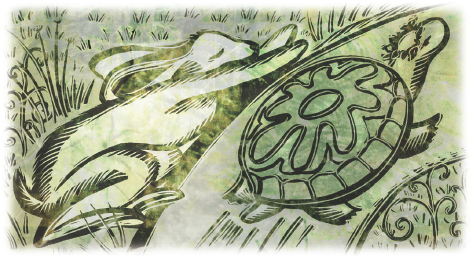
“He who breathes with your up-breath [udana] is your true Self, which is within all things.”
Brihadaranyaka Upanishad, 3.4.1
“Once upon a time, in the famous race between the tortoise and the hare, the hare rushed ahead to take the lead. Although the normal breathing of a hare tends to be around 55 breaths per minute, our racer was certainly breathing much faster as a result of his physical exertion. Both running and breathing fast are tiring for the body, so the hare was forced to make frequent ‘pit stops’ to refuel and rest. As a result of his fast, erratic breathing, which necessitated these constant stops and starts, the hare lost the race. The tortoise, on the other hand, started the race slowly and managed to maintain his steady pace throughout. Because he walked rhythmically, rather than running, he had no need to increase his normal rate of breathing by much – tortoises tend to take around 3–5 breaths per minute. This enabled him to complete the course without stopping – and to win the race.”

If you look at your life, would you stay that you rush around like the hare? Is your life composed of ups and downs or stops and starts? Or are you more regular in your habits, not allowing yourself to become over-tired and tending to cope with trials without making a fuss, like the tortoise? There is a theory in India, which of course cannot be proven, that your lifespan is not measured by the number of years, but by the number of breaths you take. Therefore, if you speed up your breathing by making it fast and shallow, you use up your allotted breaths faster and shorten your time on Earth. A person of average health takes around 18 breaths per minute when awake – or 1,080 breaths per hour. Therefore, during a 24-hour day, you take in around 24,000 breaths (your breathing slows during sleep). At just under 9 million breaths per year, you will have taken over 600 million breaths by the age of 70. An excitable person who breathes more quickly probably reaches that number of breaths much earlier. The hare, with his 55 breaths per minute, has a life expectancy of 10 years, while the tortoise with his 3–5 breaths per minute lives some 193 years (see chart of comparisons below).
By using the energy of udana, your expressive breath, you can learn to slow your rate of breathing and to direct the breaths you take in a more positive way. With regular practice of the breathing exercises in this chapter, you will be able to take fewer breaths and become better equipped to put each breath to healthy use, since udana energy regulates cognitive skills as well as controlling the tension of your vocal cords to help you to express yourself.
RELATIVE RATES OF BREATHING AND LIFESPAN
| Approx. number of breaths per minute | Average life expectancy | |
| Hare | 55 | 10 |
| Human being | 15–18 | 70 |
| Tortoise | 3–5 | 193 |